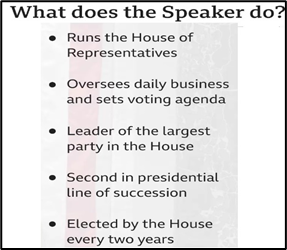Why in news?
- After losing multiple votes for Speaker due to opposition from his own party, Republican leader Kevin McCarthy finally became the Speaker of the United States House of Representatives.
- In a five-day-long saga, which was the longest speakership election in 160 years, the California Republican finally managed to garner enough support to win the top job.
What’s in today’s article?
- Speaker of the United States House of Representatives – About, role, importance, election
Speaker of the United States House of Representatives
Who is a Speaker of the House?
- The US Constitution established the role of Speaker of the House, which oversees the lower chamber of Congress.
- The Speaker is both traditionally and historically a sitting member of the majority party, though this is not a constitutional requirement.
- Therefore, in addition to leading the House of Representatives, they are also leader of the majority party in the chamber.
What is the role of the Speaker?

- At a practical level, the Speaker:
- sets the House's legislative agenda,
- controls committee assignments,
- sets the vote and work calendar, and
- is responsible for keeping their party members unified behind major initiatives.
- The Speaker is second in line for the presidency, following the Vice-President, in the event of the President being incapable of continuing in office.
Why is the Speaker of the House so important?
- Depending on the partisan makeup of Congress, they can make or break a US president's agenda, stymie opposition, and spearhead their party's biggest legislative initiatives.
- A shrewd and effective Speaker will be able to marshal their members behind their party's agenda, and control rebellious lawmakers by doling out incentives or punishments.
How is Speaker chosen?
- No House without a speaker
- The House of Representatives functions on a two-year cycle, known as a "session."
- The mid-term elections were held in the United States on 8 November, 2022.
- The new Congress began on 3 January 2023 and Republicans will be in the majority.
- The very first thing a new session of the House of Representatives must do is vote for a Speaker of the House.
- Without that person in place, the chamber cannot move on to any other function, including swearing-in members.
- The chamber must continue to hold votes until a Speaker is elected.
- Nomination for Speaker
- In the weeks after an election, the Republican conference and the Democratic caucus hold an informal vote among their members.
- This voting is done to decide who they want to nominate to lead their party.
- But members are not obligated to vote for the party's chosen candidate.
- While it has been the tradition for the speaker candidate to be a member of the House, it is not required.
- Voting
- The vote for Speaker requires a candidate to receive the support of a majority of the House - 218 votes (out of the 435 members of the House).
- The existing leader of the majority party is usually presumed to be the person to assume the speakership.
- For more than a century, the Speaker of the House was decided on the first vote.
- However, this time, a record-making 15 voting rounds were conducted before McCarthy succeeded in acquiring the Speaker’s gavel.










